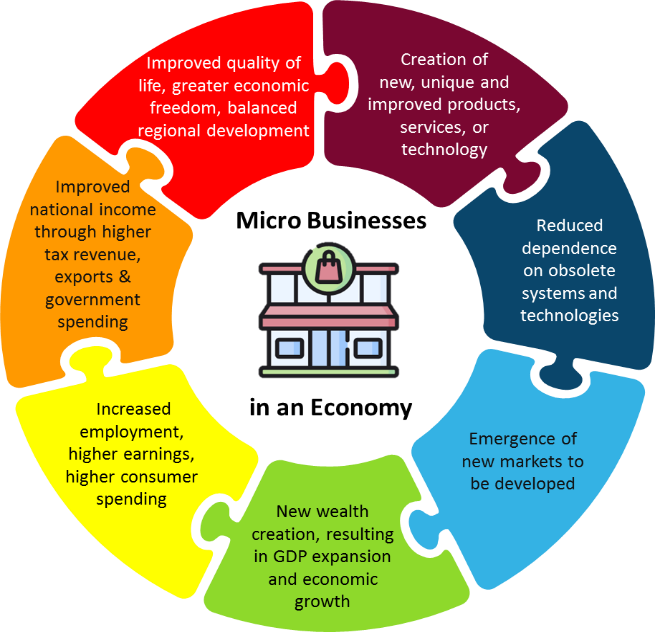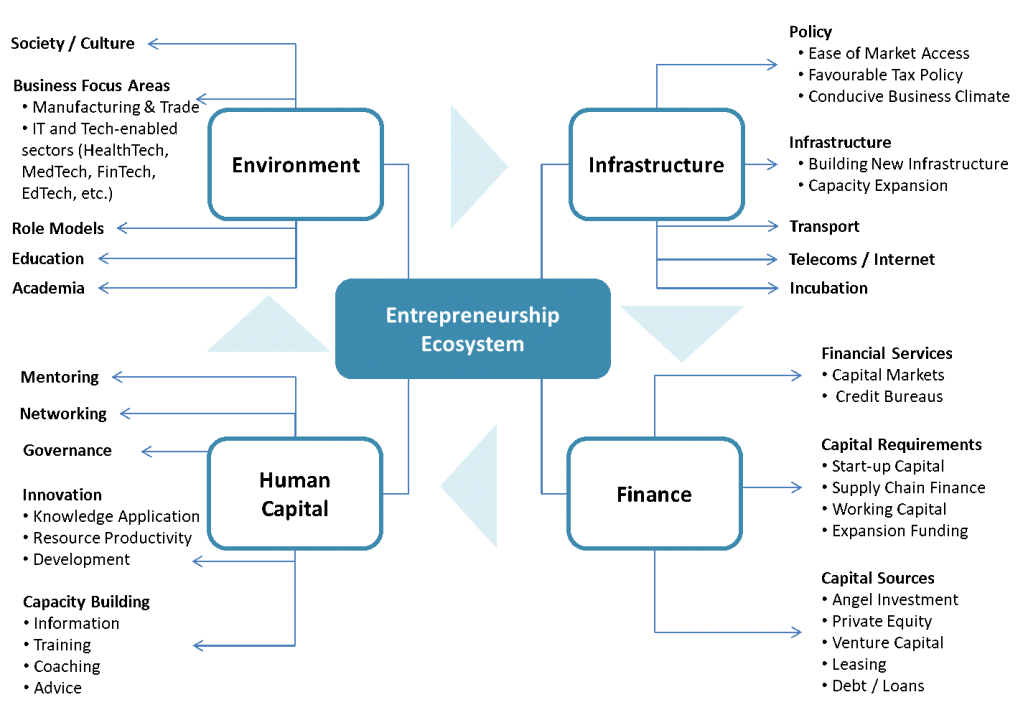Entrepreneurs and small businesses are the lifeblood of an economy. The importance of entrepreneurs in the global economy cannot be understated, given their significant role in fostering innovation, creating jobs, and a highly competitive environment.
Not only do they contribute to growth and prosperity, they have also played a fundamental role in shaping economies. From tapping into oil reserves, to creating architectural behemoths, supply chains and manufacturing capabilities, to building innovative technologies that have enhanced standards of living; wealth creation and economic prosperity across eras have stemmed from entrepreneurial ideation. However, it is the successful trailblazing giants that are often accorded with all the success for economic growth. This not only endangers innovation but even limits the scale of economic growth for a nation, particularly emerging ones. With emerging new technologies and digital connectivity, entrepreneurs have more access than ever before to a limitless data pool and new opportunities to create, innovate and grow, driving overall economic evolution. It is thus crucial that governments encourage, nurture, develop, motivate, incentivize and reward such national assets in order to foster a thriving startup ecosystem.
The UAE has come a long way over the years, and is now a prominent ‘center of innovation’ in the MENA region, upgrading its capabilities, research institutions, as well as human resources to foster new ideas and business models that competitive SMEs and businesses require for success. The UAE government has played a significant role in promoting these entrepreneurial efforts, and nurturing a successful startup network. Recent initiatives such as long-term residencies and visas for investors, entrepreneurs and high-earning expats; 100% foreign ownership; cancellation/reduction of government service fees; and the millions directed by Emirati governments to strengthen the startup environment, have all worked towards this goal. The Abu Dhabi government, for instance, pledged AED 535 million (USD 145.7 million) in 2019 to support entrepreneurs and jointly invest with VC startups out of Hub71. In July 2020, Abu Dhabi further implemented a coalition project supporting micro, small and medium-sized enterprises in highly-skilled fields (science, healthcare, and IT). The UAE has also taken dedicated efforts to launch technology hubs, incubators, accelerators, and funds that provide entrepreneurs with funding and loan schemes. The Seed Capital Loan, for instance, enables Emiratis to launch micro-enterprises by funding part of the startup-capital needed, or the working capital/expansion costs for existing ones. The country’s efforts have successfully paid off with the UAE featuring among the top three innovation economies in Northern Africa & Western Asia in the Global Innovation Index 2020. It also ranked first in the MENA region and 16th globally in the Ease of Doing Business Index 2020; and 26th in 2018’s Global Entrepreneurship Index. Consequently, its startups have garnered sizable funding from investors, and entrepreneurs now prefer the UAE as a base to conduct business from.
Over the years, the UAE has clearly demonstrated its commitment to become a hub for entrepreneurial innovation and activity. In accordance with its goals, the nation must now also address the limitations to the growth of micro businesses and entrepreneurial sentiment within its borders. Although lucrative in many ways, the UAE is also arguably one of the most expensive countries for establishing a startup and conducting operations, within the Middle East. Limited access to online banking and digital financing options has also stressed the lack of holistic financial inclusion. The COVID-19 pandemic has only alleviated concerns for many small start-ups and micro businesses, who are struggling to stay afloat. With over 90% of businesses in the UAE being SMEs, the result has been evident in the declining non-oil economy for a prolonged period in 2020 (Non-oil private sector PMI was in contractionary territory for 8 months).
At a time when the UAE is grappling with the triple shock of health crisis, economic disruption and weak oil markets, it becomes imperative for the country to accelerate efforts aimed at promoting entrepreneurship and small businesses. The local government must thus revisit their policies to revive and revitalize entrepreneurial activity. The pandemic has added to existing financial woes and operational difficulties for micro-businesses, among other challenges they have no means to combat. The most pressing concern for such businesses remains cash preservation and financial liquidity amid stagnant/negative cash flows, and a hit to revenues and profitability. Accordingly, the government must take bold measures to ensure protecting entrepreneurial sentiment, and extend financing packages in the form of grants, equity, quasi-equity, microcredit, and other microfinancing facilities. A host of market participants across the tech-enabled sectors, medical and diagnostics industry, and research & development centers among others have immense funding requirements. These industries are likely to see major shifts if the required resources are made available to entrepreneurs through assistance from government agencies.
In order to remain globally competitive and rise from the pandemic induced slump, the UAE can mirror similar successful strategies in peer countries. For instance, Singapore issues multiple grants for small and micro-businesses. Initiatives like Enterprise Singapore’s Southeast Asia Open Innovation Challenge provides grants to start-ups working on gaps in industries such as media, retail, consumer tech, FinTech, PropTech, and AgriTech. In the UK, innumerous packages have been extended to small businesses to shield them from the impact of the pandemic. These include the USD 12,000 one-time grants, the government’s announcement to pay 80% wages for furloughed workers, and most recently, the USD 6.2 billion support package for businesses hit by the third national lockdown. Apart from monetary grants, governments can also take proactive steps to eliminate knowledge and information barriers, such as by creating economic development departments in each Emirate. This is will provide guidance to potential entrepreneurs and direct them to local incubators, accelerators, networking events, and relevant financing programs. This will also encourage more Emiratis, especially the new generation and women entrepreneurs, to launch micro-businesses. Laws and regulations could be made more conducive for small business owners to begin ventures, and allowing room for error and failure by backing funding schemes with government support. The UAE already boasts of a legal framework that is at par with the highest international standards, and conducive to the entrepreneurial class. It has attractive tax policies, particularly its tax-free regimes in free economic zones, and must continue to reform them to attract and promote entrepreneurship. Although the UAE’s spending on R&D as a percentage of its GDP is still below international benchmarks, long-term initiatives are likely to increase it from 0.7% of GDP to 1.5% by 2021. The UAE also aims for innovation to account for ~5% of GDP by 2021, a key milestone for the ‘UAE Vision 2021’. Such an ecosystem will result in further collaborations, funding, investment and wealth creation. While small businesses play an important role, both economically and socially, their role in reducing the informal economy is what makes them vital for development. Thus, the significance of SMEs to the economy and society in terms of their contribution to output and employment is now considered to be indisputable. Going forward, innovation and entrepreneurship will undoubtedly play a crucial role in responding to the dramatically different post-pandemic world. As we navigate the unforeseen economic disruption resulting in economic upheaval, there is a clear need for innovation and strategies that adapt to the skill sets required in this new normal. Governments must therefore ensure that issues such as lack of access to financial services, which has been a key barrier to the growth of micro and small businesses, are appropriately addressed. As innovators leverage these opportunities, smaller players will play a vital role in promoting competitiveness by introducing new products or techniques to the changing market dynamics. Moreover, it will help them become responsible for increasing productivity, mostly through expansion and inorganic strategies, and create employment opportunities in the GCC.



Comments